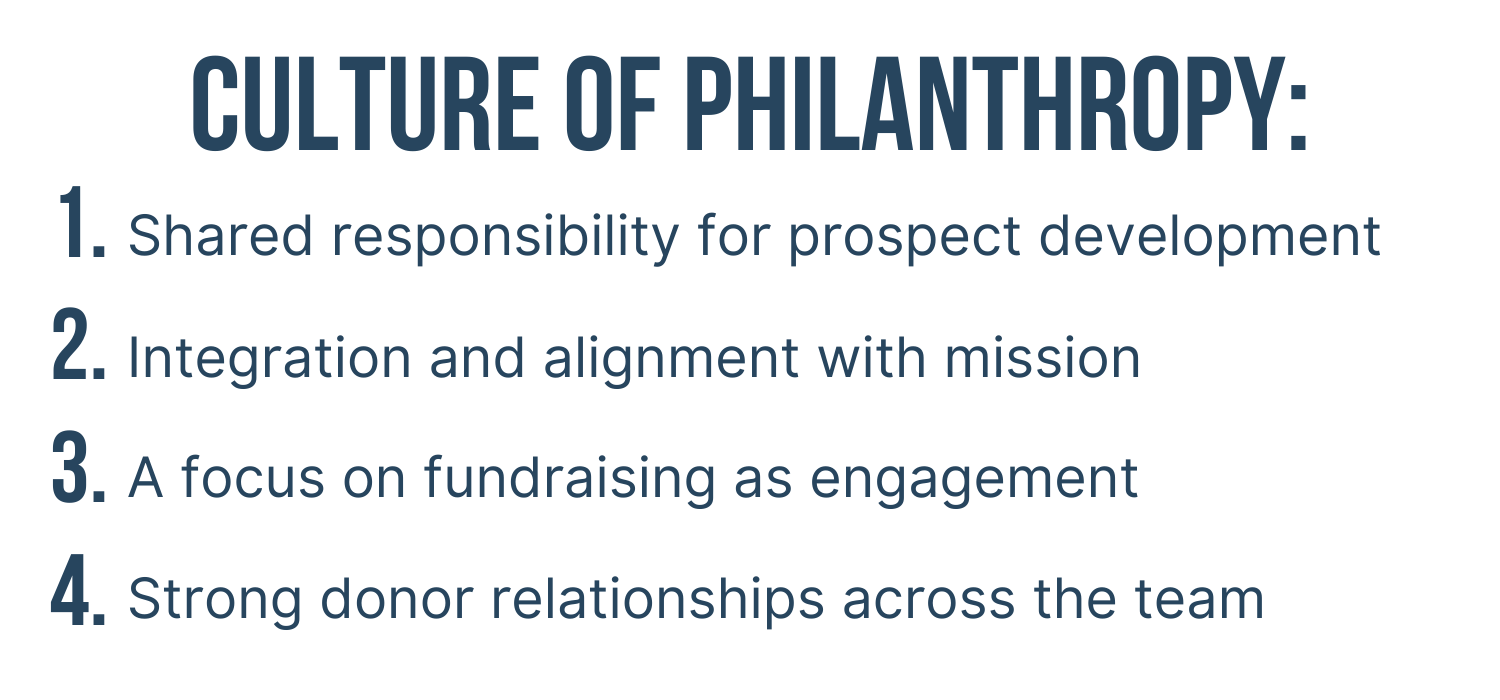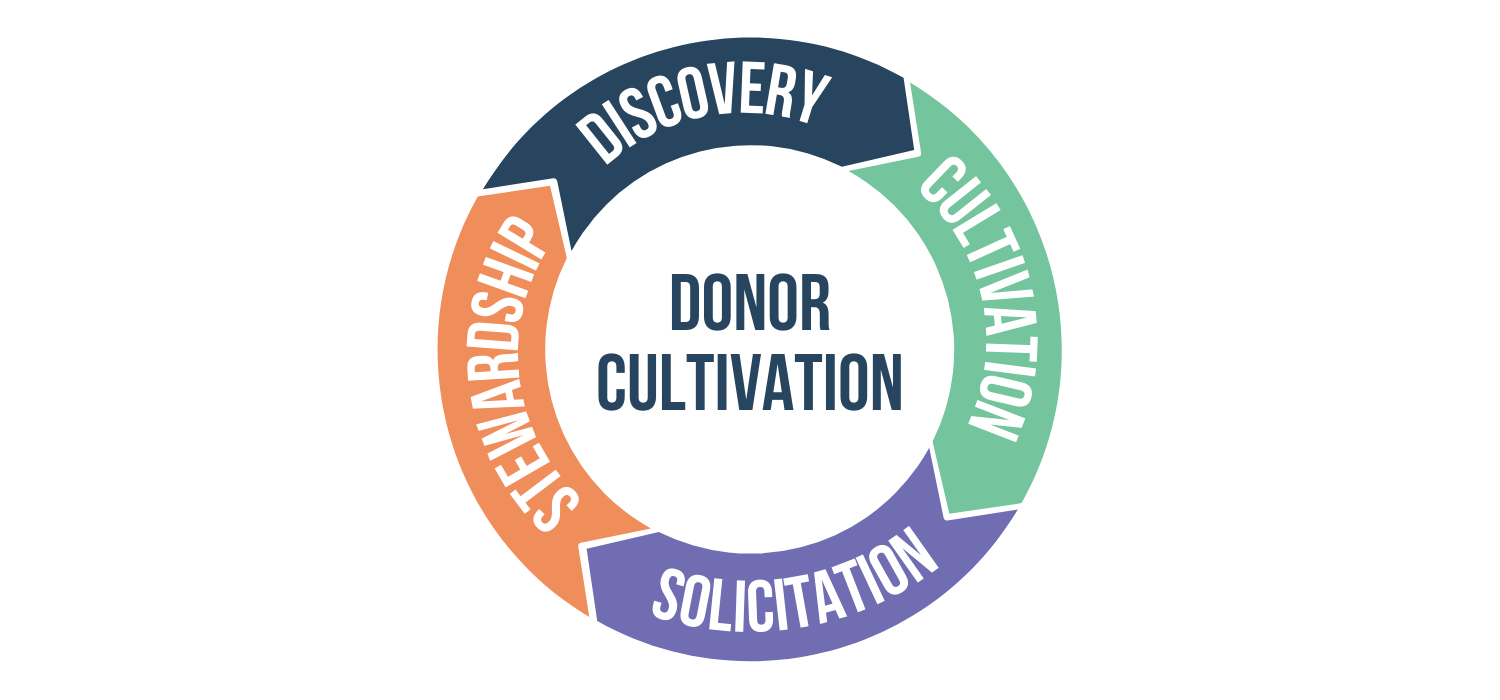Culture of Philanthropy: Aligning Marketing & Development Teams

A strong culture of philanthropy can serve as a unifying force within a nonprofit organization.
Reinforced through strong partnerships, shared goals, clear metrics, and consistent processes, a culture of philanthropy is paramount to aligning the work of an organization’s development and marketing teams. At their best, the work of these departments can be collaborative and complementary, elevating their organization’s trajectory. Yet, it is not uncommon to find these teams at odds, pursuing distinct or even conflicting goals and priorities.
So, what are the core components of a culture of philanthropy? And what are some tangible steps to enhance internal coordination between development and marketing teams?
With over 25 years of experience in higher education, program development, and nonprofit advancement, CFA Principal Kristin Love answers these questions and offers strategies to increase internal alignment while enhancing your organization’s culture of philanthropy.
Building a Strong Foundation for Growth
Not always visible on the surface, a culture of philanthropy is more akin to an organizational undercurrent. Despite the plethora of ways that a culture of philanthropy can manifest within a nonprofit, a recent study examining shifts in the culture of philanthropy identified four common components that make this seemingly ambiguous term more tangible.

By definition, nonprofits are dependent upon philanthropy to carry out their mission and remain economically viable. When a culture of philanthropy is a core element of the organization’s broader culture, it provides a mutually reinforcing set of beliefs, accountabilities, and actions that prioritize fundraising at every level of the organization. As a result, all staff – from the top to the bottom – understand their role in advancing philanthropy within their organization and appreciate the role of philanthropy in advancing their work.
Strengthening the Donor Cultivation Cycle
The benefits of aligning development and marketing teams around a shared culture of philanthropy are visible within every stage of the donor cultivation cycle. While there are clear distinctions between annual and major giving cultivation cycles, strong partnerships between development and marketing are vital for nurturing donor relationships at all philanthropic levels.
- Discovery: Marketing can offer development a relevant lead generation pipeline by reviewing data such as open rates, click-throughs, and social media activity to identify new donor prospects amongst new and highly engaged constituents.
- Cultivation: Development can partner with marketing to create and execute communication plans and donor engagement opportunities that feature a balance of program impact and philanthropic storytelling relevant to a wide range of target audiences.
- Solicitation: Marketing can support development in the design of compelling appeals, proposals, and supporting materials to inspire new, renewed, and increased giving.
- Stewardship: Development and marketing can partner to retain current donors through consistent and creative storytelling that reaches constituents through a variety of formats and channels, providing donors with various opportunities to identify with the organization.
Fostering Greater Connectivity Between Development & Marketing
Whether your organization seeks to establish a stronger culture of philanthropy or simply wants to enhance collaboration between development and marketing functions, pursuing these key steps will help move the needle on both fronts.
- Build relationships between development and marketing teams at all levels.
While few staff are eager to add another recurring meeting to their calendars, development and marketing leaders must come together to prioritize team building, support ongoing communication, and provide a clear line of sight to mutual priorities. - Establish shared goals articulated within a comprehensive development plan.
Development planning is a collaborative process that articulates the goals, strategies, activities, and accountabilities of each fundraising program. The benefits of the development planning process and resulting document extend far beyond the development team by articulating points of connection and fundraising-related accountabilities across marketing and other functions within an organization. - Identify separate leading indicators to drive specific accountabilities.
While development often gets the glory as the revenue-generating team, marketing deserves credit for their pivotal role in the fundraising success of an organization. To balance the share of credit, establish metrics that will focus actions and accountabilities within each team. Rather than relying solely on lagging indicators such as dollars raised – a metric that is often attributed solely to development – organizations can lean into activity- and outcome-based leading indicators that will distinguish the roles of development and marketing staff while actively engaging both teams throughout the donor cultivation cycle.
It is important to note that these tactics are relevant to and can be adapted for organizations with any number of development and marketing staff. Regardless of your role (development, marketing, or both) or the size of your team, establishing fundraising as a shared and integrated responsibility is sure to have a lasting impact on your organization’s internal culture and external impact.
Partner With Us
CFA’s consulting team is adept at partnering with development and marketing teams alike to enhance their organization’s culture of philanthropy while maximizing fundraising success. If you are interested in exploring how CFA can partner with your development and/or marketing teams, contact CFA today.

Kristin Love, Principal
Kristin is a proven capacity-builder, collaborator, and change-maker in the philanthropic space, with over 20 years of experience in higher education, program development, and nonprofit advancement. Prior to joining CFA, Kristin served as Vice President for Development at Loyola Marymount University in Los Angeles, California. At LMU, she oversaw efforts to evolve development structures and processes to motivate an accountability-driven environment, partnering with academic and administrative leadership to align goals and priorities in pursuit of increased philanthropy.
Before LMU, Kristin held leadership roles in the advancement offices at Colorado College and University of Denver, championing creation of new initiatives at both institutions that integrated engagement and philanthropy. Her career experience includes development roles at large national and small local nonprofits, as well as global organizations such as JDRF International. Her passion for mission-centric fundraising work and the positive impact it can have on institutions and organizations began as a work-study student in the grants office at her alma mater, Baylor University, where she earned a BBA in public administration and Spanish.
A native of Dallas, Texas, Kristin spent over two decades in Colorado before relocating with her family to the Los Angeles area in 2020. The mother of 15-year-old twins, Kristin enjoys watching her daughter’s athletic pursuits, and son’s music and acting endeavors. In her free time, she can be found traveling or at a potter’s wheel.
Kendall Carlson, Content Writer
A frequent contributor to CFA’s digital content, Kendall Carlson has spent her career advancing nonprofit organizations across the Twin Cities. With 16 years of experience, Kendall brings a balance of strategic and operational leadership spanning fundraising, program development, evaluation, and strategic planning.
Most recently, Kendall served as Development and Communications Director at Hired, where she diversified revenue for the organization’s $11M budget and increased individual giving by 60%, led a rebrand, and launched an organization-wide data for impact initiative. Prior to Hired, Kendall served at Greater Twin Cities United Way, where she led an advancement strategy team to increase investment and engagement from the organization’s top corporate and major donors. Kendall is known as a strategic, solution-oriented leader with a high capacity for detail and commitment to quality. She launched her consulting practice, Luminate Consulting, in 2022 to bring her skills in fundraising and program strategy to nonprofits seeking sustainable growth.


